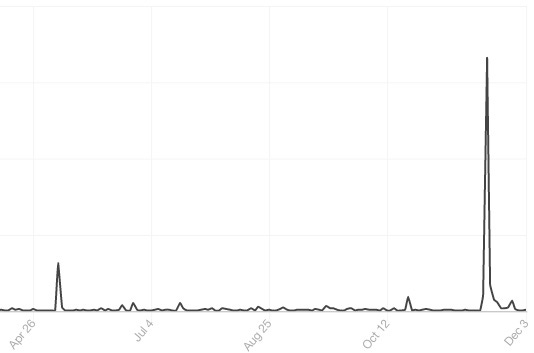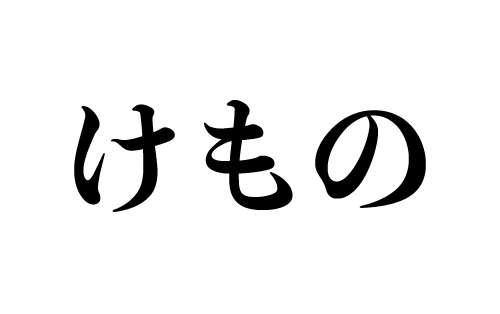不惑
Confusion-less - How to Japanese - December 2021
This is How to Japanese, a monthly newsletter with something about Japan/Japanese and a dash of いろいろ.
日本・日本語: No Doubts
Happy Holidays to everyone out there. I hope this email finds you…existing.
Unfortunately it finds me on the wrong side of the Pacific Ocean. My planned December 1 arrival to Japan was 31 hours and 15 minutes too late. It’s definitely a disappointment, but I didn’t have my life thrown into disarray like some of my classmates—I just slept in, unpacked my bags, and restocked all the groceries I threw out—so I can’t complain too much.
At any rate, it’s a confusing time for everyone, and I’m not immune to confusion, despite having achieved the substantial age that in Japanese (and Chinese?) is marked by its supposed lack of confusion: 不惑 (fuwaku, 40 years old).
I may or may not be responsible for this segment on Higashimura Akiko’s podcast (from the 38:28 mark):
She invents the word エーフー (ēfū) as an abbreviation of the very silly エイティハーフ (lit. “eighty half”), but she also provided what I was really looking for: an easy alternative to admitting I’m now middle-aged. 不惑 comes via Confucius’s Analects (論語). Here’s the full quote in Japanese translated from kanbun via Wikisource, with links to the reading and meaning for each section from Kotobank:
子曰く、吾れ十有五にして學に志し、三十にして立ち、四十にして惑はず、五十にして天命を知り、六十にして耳順ふ、七十にして心の欲する所に從へども、矩を踰えず
故事ことわざ辞典 provides this modern translation that’s easier to understand:
私は十五才で学問を志し、三十才で学問の基礎ができて自立でき、四十才になり迷うことがなくなった。五十才には天から与えられた使命を知り、六十才で人のことばに素直に耳を傾けることができるようになり、七十才で思うままに生きても人の道から外れるようなことはなくなった。
And you can find an English translation from the Chinese Text Project:
The Master said, "At fifteen, I had my mind bent on learning. At thirty, I stood firm. At forty, I had no doubts. At fifty, I knew the decrees of Heaven. At sixty, my ear was an obedient organ for the reception of truth. At seventy, I could follow what my heart desired, without transgressing what was right."
Each age is then further simplified into these easy-to-use compounds:
志学 (shigaku) - 15 years old
而立 (jiritsu) - 30 years old
不惑 (fuwaku) - 40 years old
知命 (chimei) - 50 years old
耳順 (jijun) - 60 years old
従心 (jūshin) - 70 years old
I wrote about 還暦 (kanreki) for the JT last year and いい年 (ii toshi) earlier this year, but I was not familiar with any of these age-related phrases. They’re a fun way to add some color to your vocabulary. And it’s a bit of a relief, to be honest. I’ve still got 10 years to figure out the decrees of Heaven.
On a separate note, 四十路 (yosoji) is the other term that Higashimura-sensei briefly suggests. This website has a nice explanation and also includes these 40-related words: 壮年 (sōnen, prime of life), 中年 (chūnen, middle age), and 初老 (shorō, near-elderly).
いろいろ
I stumbled across a link to Murakami’s “Murakami Radio” broadcasts on NicoVideo while searching for either a Beatles song or something about Murakami—I can no longer remember which, and it could’ve been something else entirely. Whatever the case, it’s been very strange to hear extended stretches of Murakami’s voice in Japanese. I think nearly every broadcast is online. Check out the link I shared in the tweet below, which is the second page of search results, thus giving you easy access to the first episode. I'll include some other tweets with commentary.
 Just discovered my study music for the next 28+ hours - all the Murakami Radio recordings are up on Nico Video.
Just discovered my study music for the next 28+ hours - all the Murakami Radio recordings are up on Nico Video.
 Episode 5 of "Murakami Radio" from around the 17:00 mark has a nice long quotation from Hard-Boiled Wonderland, and Murakami discusses the multiple endings (he says three!) he wrote. He says he doesn't remember the other versions.
Episode 5 of "Murakami Radio" from around the 17:00 mark has a nice long quotation from Hard-Boiled Wonderland, and Murakami discusses the multiple endings (he says three!) he wrote. He says he doesn't remember the other versions.
Apparently the National Diet Library 食堂 (shokudō, cafeteria) is near and dear to many people. This is the response to last month’s newsletter:
Welcome and thank you to all new subscribers. I can guarantee that future content will be as obscure as last month’s, but I cannot guarantee it will reverberate as nostalgically.
This was a really interesting read:
Nagasawa, the dictionary blogger who wrote about the National Diet Library, has a post comparing a dozen or so definitions of けもの vs けだもの to triangulate the difference between the terms. It highlights why it's important to check a Japanese dictionary somewhat regularly, even when you're translating into English.
The results for this year's 創作漢字コンテスト (Created Kanji Contest) are online!








